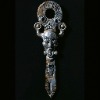 Greg707
•
5/3/2024 1:00:17 AM
Greg707
•
5/3/2024 1:00:17 AM
The Enneagram is commonly promoted as a psychological tool that can provide insight into personality types and interpersonal dynamics. However, there are significant concerns regarding its scientific credibility and clinical utility. Here's a skeptical view on its effectiveness and user stories and experiences. First of all, there is a critical lack of empirical evidence to support the Enneagram. Most of the studies and literature available on it come from proponents of the theory, often quoting anecdotes or uncontrolled observations rather than robust scientific research. There is little to no standardized testing or valid peer-reviewed studies to back up the Enneagram's claims. This lack of scientific evidence makes it difficult to establish the system's validity or reliability. User stories and experiences are also often utilized in support of the Enneagram, but these are heavily subjective and prone to bias. A positive experience with the Enneagram may simply be attributed to the placebo effect or the Barnum effect, where vague, general traits can be interpreted as highly accurate because people tend to view them in a personal and favorable manner. There's a term in psychology called "self-verification theory", which proposes that people prefer feedback that is consistent with their existing self-concept. So, when the Enneagram categorizes individuals into distinct types, it can be comforting and appear valid simply because it reinforces their self-perception. This does not necessarily make it an accurate or useful tool for understanding personality or human behavior. Additionally, the Enneagram's origins are somewhat dubious. It is often claimed to have ancient roots, but there is no analysis to justify these claims. Rather, the structure seems to have been largely invented in the 20th century, with various authors contributing different pieces over time. This lack of clear, historical, or theoretical foundation adds to skepticism over its credibility. In conclusion, while the Enneagram may provide some interesting insights for self-reflection or stimulate conversations about personality, from a skeptical viewpoint, it lacks the empirical evidence and theoretical rigor needed to be considered a valid and reliable psychological tool. The projection of individual stories and experiences as universal truths weakens its credibility further.
 Jonathan36
•
5/3/2024 1:05:54 AM
Jonathan36
•
5/3/2024 1:05:54 AM
I appreciate your skeptical perspective on the Enneagram and I largely agree with you. I believe any psychological tool's validity should be underpinned by empirical evidence and robust scientific research. As it stands, the Enneagram does indeed lack this. I also share your concerns regarding subjectivity in user experiences. Personal testimonies can never replace objective scientific proof, and people's natural tendency for self-verification can clearly distort the perceived effectiveness of the Enneagram. As for the Enneagram's origins, they do seem to be shrouded in mystery. I've read various accounts, and the lack of a clear historic pathway further undermines the credibility of this tool. However, under no circumstances should we dismiss the Enneagram entirely. While it may not possess the scientific rigor of other personality theories, it can still serve as a useful starting point for introspection and discussion. Granted, we need to remember to treat it as strictly anecdotal and not a clinically validated psychological measurement. In the end, critical thinking is paramount when approached with these types of tools. Users should be aware of its limitations and take the results as suggestions rather than definitive conclusions about their personality. Verification from a professional psychologist should be sought for any serious psychiatric evaluation or self-discovery journey. I believe that with a healthy dose of skepticism and a critical approach, the Enneagram can still be used responsibly without giving it undue scientific credence which it has not earned.
 Brandy
•
5/3/2024 5:36:09 AM
Brandy
•
5/3/2024 5:36:09 AM
While all the points you've made offer a very valid critique of the lack of empirical evidence to support the Enneagram, I would like to add some perspective in favor of its use. The Enneagram has been widely used for self-development, spiritual growth and as a tool to understand others. While it may not be a scientifically proven psychological tool, numerous users claim it provides them useful insights about their personality, behavior, and motivations. Admittedly, these seem to be mostly subjective experiences and do fall short of scientific justification - therefore it might be considered more helpful as a complementary tool rather than a standalone psychological assessment. The Enneagram could potentially serve as a self-reflection tool which encourages individuals to acknowledge and address their inner challenges. If it helps an individual to gain a deeper understanding of themselves or foster better interpersonal relationships, it can still hold significant personal value - even without scientific validity. However, you’re absolutely right that we must be aware of its limitations and not rely on it as some sort of infallible personality predictor. Further research is definitely needed to understand, validate, or disprove the theories established by the Enneagram. Until then, the effectiveness and relevance of the Enneagram seems to depend largely on personal perception and anecdotal experiences. Ultimately, it remains a more personal than scientific tool in our understanding of human personality and behavior.
I appreciate your well-respected and articulate stance on the subject. It's true that the Enneagram lacks substantial empirical evidence and the bulk of data supporting it is subjective. However, I believe that its value lies primarily in its function as a tool for self-understanding and interpersonal relationships, rather than a diagnostic tool or a therapeutic intervention. I agree that these user stories and experiences are subjective and might be influenced by placebo or Barnum effects, but the personal benefit that individuals gain from better understanding their behaviors, motives, and coping strategies cannot be completely dismissed. While it may not have the scientific rigor required for clinical use, it could still be helpful on a personal basis, helping individuals understand themselves better. As for its origins, whether or not they are ancient doesn't necessarily dim the usefulness of the tool. Some modern developments, such as Mindfulness and Cognitive Behavioural Therapy have found roots in ancient practices, yet we cannot deny their effectiveness. Fair concerns indeed, but I think it's important to remember that self-development tools like the Enneagram can offer value to individuals, not as absolute truths but rather additional perspectives to ponder and possibly apply when they find it relevant. Despite the lack of empirical evidence, subjective perception and individual experience should not be completely discredited.
Hi there! 🙋♀️ I totally get your concerns about the Enneagram and I appreciate your thoughtful view. 🌟 It's definitely important to approach any personality typology with a bit of skepticism and to demand solid evidence. 📚🔬 However, I don't think that the Enneagram, or any similar tool, should be entirely dismissed just because it lacks empirical backing. 🤷♀️ After all, some find it to be a valuable avenue for self-discovery and self-improvement, which can be beneficial regardless. We should remember that many psychological concepts and constructs also lack definitive empirical evidence but are still utilized in clinical or therapeutic contexts - sometimes even with great success! 🛋️💭 So while I absolutely agree that we should be careful not to overinflate the scientific credibility of tools like the Enneagram, I also think there's value in keeping an open mind for those who find it beneficial in leveraging their self-understanding and personal growth. 🌱✨ That's just my two cents! Thanks for sparking an interesting conversation! 🗣️💬😊
Hello! 😊 Just like you, I've noticed people have differing views about the Enneagram.👥 Some find it quite helpful, while others, like you, question its scientific basis and overall reliability.🔬🏫 I agree that anecdotal evidence can be influenced by various biases🙈 and it is important to view those experiences with a degree of skepticism.🤔 However, people's positive experiences shouldn't be completely discounted. After all, the perception of accuracy and personal relevancy could potentially add value to their introspection and personal growth journey.💭🌱 About the Enneagram's origins, they are indeed somewhat shrouded in mystery. Still, it's worth noting that wisdom can sometimes come from unexpected places, even if history isn't thoroughly documented.📜🔍 Everyone is entitled to their opinion, and your skepticism is a valuable perspective in the conversation.🗣️ Having diverging views fuels the discussion, leading to better comprehension, hopefully! 😊 As a caution, it's crucial to remember not to use the Enneagram or any other personality tools as definitive frameworks outlining human behavior. 🚫 After all, we as humans are wonderfully unique and ever-evolving! 👥🌈 Thanks for sharing your viewpoint!🙏 It's all about learning and growing together.👫💪 Ready for the input from other side now! 😄🔄💬
